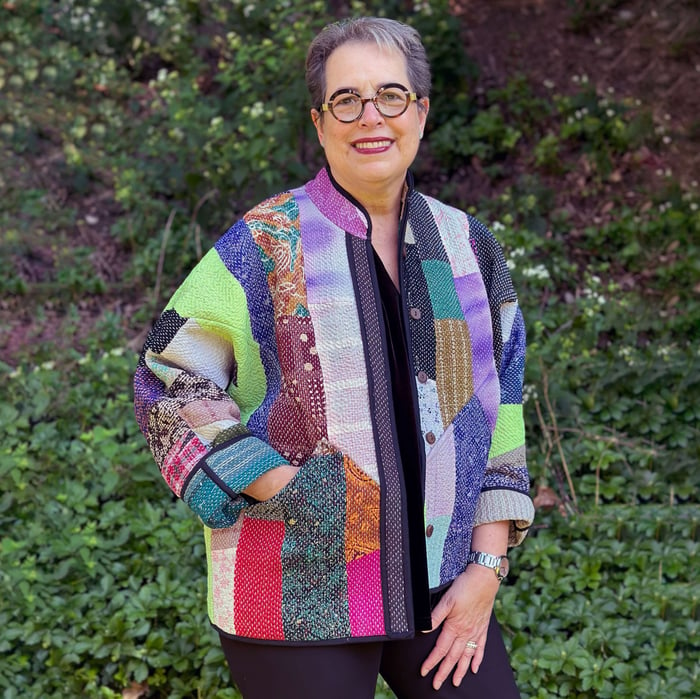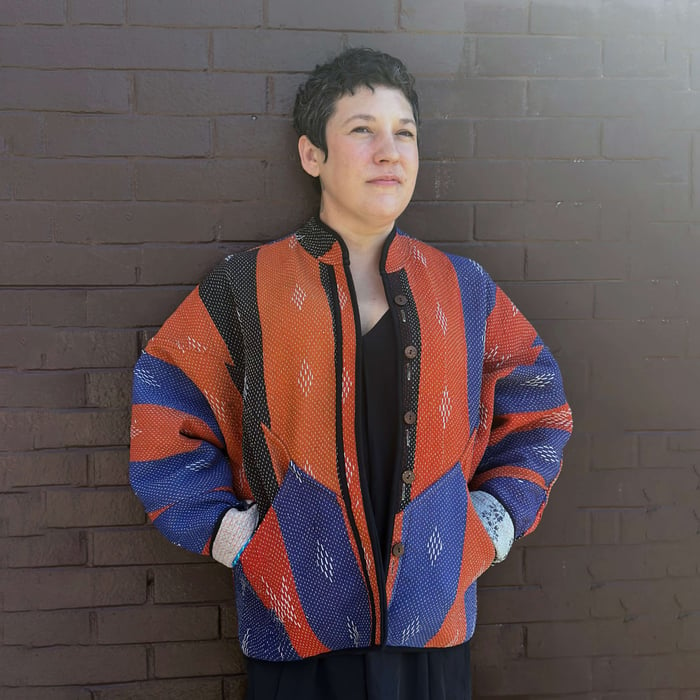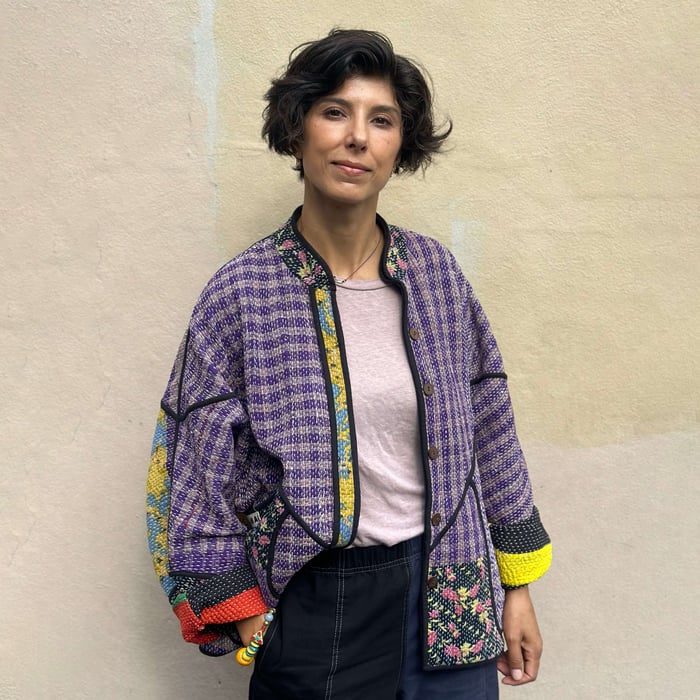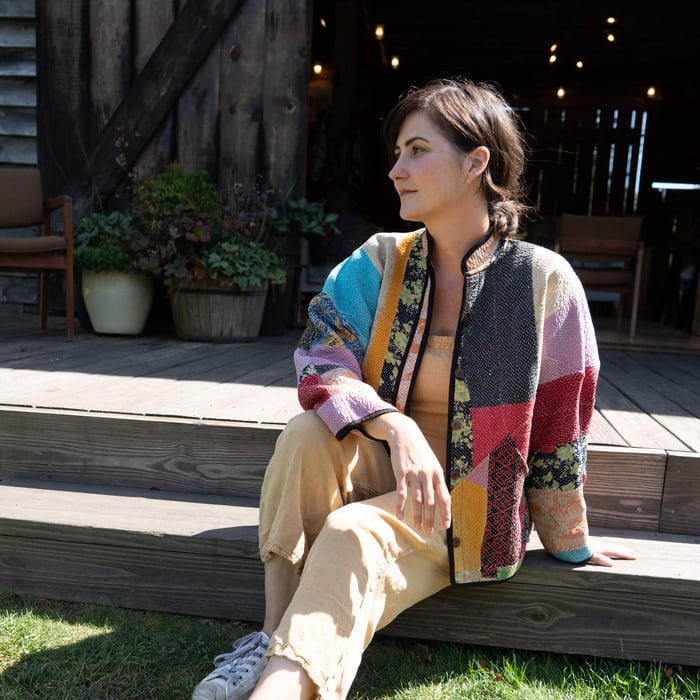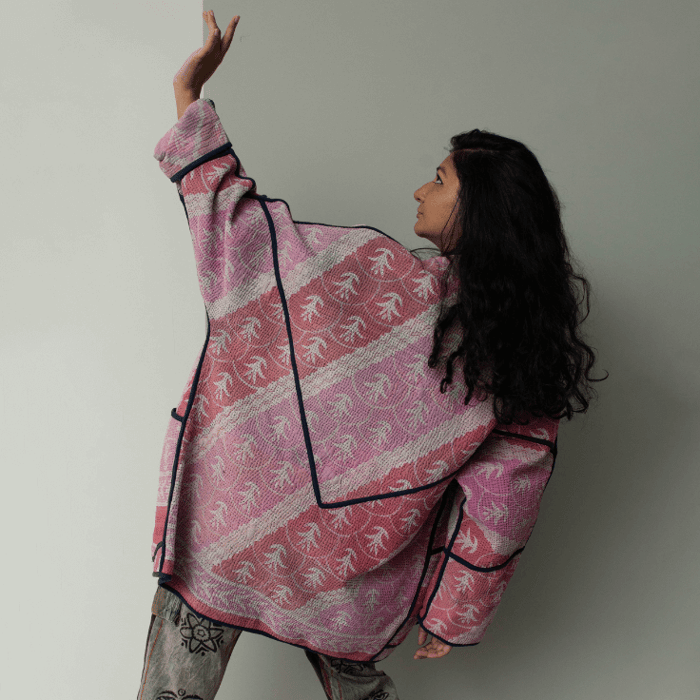I spotted Laura on the 9th floor of Columbia Hospital ahead of getting an immunotherapy/chemo infusion. I noticed her immediately because she was stylish and wearing some incredibly beautiful black ostrich leather cowboy booties. After checking in I went and sat down beside her, and complimented her. She said she liked my shoes too (black and white checkered skate vans) and noticed my jacket (Namai of course) and so we connected on a love of clothing. We stayed in touch, meeting her made a profound impression on me.
It’s hard to overstate how anonymous and sterile a cancer hospital can be, and even though it’s in NYC, it was incredibly rare for me to make a genuine connection with a fellow patient. Going in for treatments and tests I always used clothing as a comfort, bright colors, noisy textures, fun shoes…. But looking back now, I think it was also a beacon, a flag, a way to say- this is who I am, does anyone see me? And Laura did that day. Sometimes it takes something to occur (being recognized) to notice how difficult the absence has been.
I visited Laura at her home in Wyckoff, NJ to talk about her experiences with metastatic breast cancer and hear her story, which she later wrote down.
How did you discover that you had breast cancer the first time around?
Laura: From a routine mammogram in 2008. This news was especially difficult for me, as my husband’s first wife passed away from metastatic breast cancer (MBC), also known as advanced breast cancer, or stage IV.
How did you navigate your career and relationships during that time?
I had a rewarding career in the furniture business where I always had flexible hours, so I continued working, taking a few days off every few weeks for chemotherapy. I got a fabulous wig and just kept on going. Fortunately, I had continued support from friends and family; especially from my husband.
What was it like finding out that you had metastatic cancer nine years later? And how did you discover it? How was the treatment?
It was devastating; especially knowing the statistics of a stage IV diagnosis. My only symptom was a swollen hand, resulting in my rings being tight. It took six months and many doctors to figure out that I had a large tumor on my subclavian vein blocking the blood flow to my hand. I also had multiple lesions in one lung, as well as one leaning on my jugular vein. I had radiation to the larger tumor and was put on targeted therapy; Ibrance plus Letrozole, which resolved all of my other lesions. I am approaching seven years on this treatment.
As a first line of treatment for stage IV, quality of life is very different from an early stage diagnosis. Earlier stage treatments typically involve heavy doses of intravenous chemotherapy, which is normally very debilitating, with extensive side effects including hair loss. On the other hand, the first line of treatment for stage IV typically involves taking oral medications daily. However, the side effects, which still exist, are milder than those from treatments in earlier stages.
You’ve told me that when you were stage one, you weren’t really a part of the cancer community, but after receiving a metastatic diagnosis you became very involved in “Cancerland”.
Involvement in the metastatic community has totally changed my life. I have met incredible women whom I would never have met from all different walks of life. For me, it has been the silver lining. We have a remarkable sisterhood.
When we started communicating over email, you shared a lot of resources, of groups and organizations, which I really appreciated.
I love being able to share my resources. It is a gift that I’ve received and I now love to pay it forward.
We met at Columbia because we noticed each other's outfits. How has fashion been a part of your recovery?
This is a very interesting question that I actually never thought about. Style, fashion and a love of fine design have always been a major part of my life, but I am actually very intentional about what I wear everywhere. Trite as this may seem, it is very much who I am. For us, it was an instant bond.
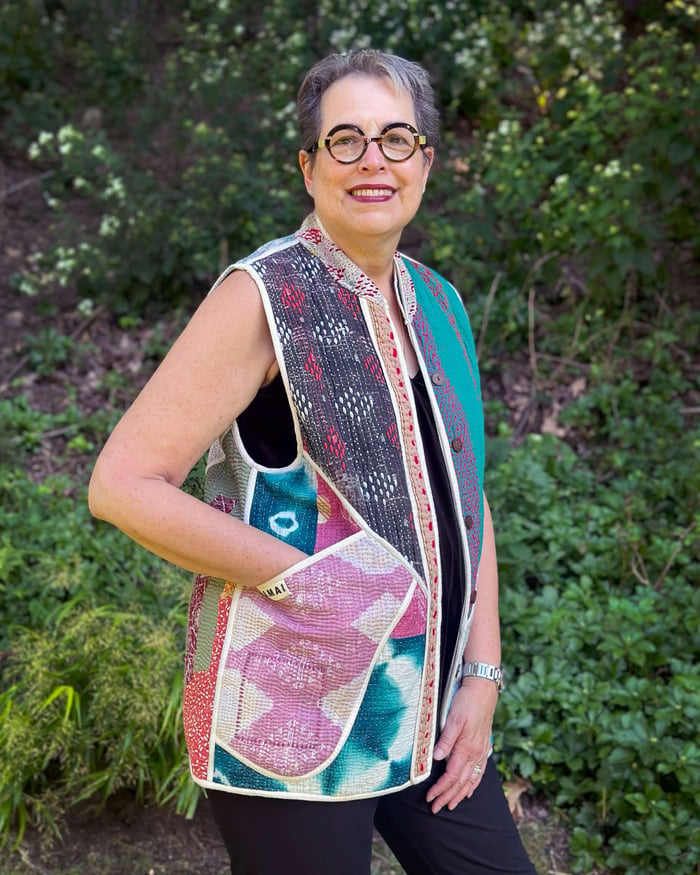
Were there areas of your life where you made big changes post breast cancer?
I retired from my job, although retirement was right around the corner anyway. Exercise became a very important part of my life. I swim almost daily, and frequently take nature walks. It is so important to keep as active as possible!
How has travel changed in your life? Does it play a more important part for you?
Travel has always been one of my greatest joys, but this is especially so since my metastatic diagnosis. Although my husband and I took a break during Covid, we have continued our travels to many new places. I find that I now live my life with an urgency; I want to get in as much as I can.
You’ve been in treatment for a long time, does the diagnosis and treatment feel very present in your day-to-day life?
I see my oncologist and have bloodwork every four weeks, so yes; cancer is definitely a daily presence for me, but not in a negative way. I feel blessed. I have quite a bit of fatigue from my treatment as well as constant anemia but fight it with every bit of my being. I listen to my body and give myself grace.
A lot of people aren’t aware that most of cancer research actually goes to prevention and early stage cancer, and that only 2-5% of funding is dedicated to metastatic cancer, even though it is the most necessary area of research. How can we change this? What organizations do you recommend people donate or volunteer their time with in order to contribute to changing this?
October seems to be focused on “breast cancer awareness”. We are all aware of breast cancer. No one dies from early stage breast cancer. Everyone that loses their “battle” to this insidious illness, passes from metastatic disease, which means that it has progressed beyond the breast to invade other parts of the body. There is currently no cure for MBC.
I am involved in quite a few breast cancer organizations that have provided immeasurable support to me, but Metavivor https://www.metavivor.org/ is the only one that gives 100% of their contributions to metastatic breast cancer research.
What organizations have helped you deal with your diagnosis?
Living Beyond Breast Cancer: https://www.lbbc.org/
Share: https://www.sharecancersupport.org/
Breast Cancer Options: http://www.breastcanceroptions.org/
These organizations have specifically targeted programs for those of us who are living with metastatic disease. We have different needs from those with early stages of breast cancer.
Does music help you deal with cancer?
Yes it does. My husband and I are jazz enthusiasts. One of our greatest joys is going to small jazz clubs and attending concerts.
October can be a really difficult month for breast cancer survivors and people undergoing treatment. What are your coping strategies and feelings about this?
Honestly, I ignore everything pink. It is so overdone. Community is everything. There is a ton of support out there for those affected by breast cancer. We are very fortunate in that respect, versus people suffering from less common types of cancer. I just try to live my best life every day.

